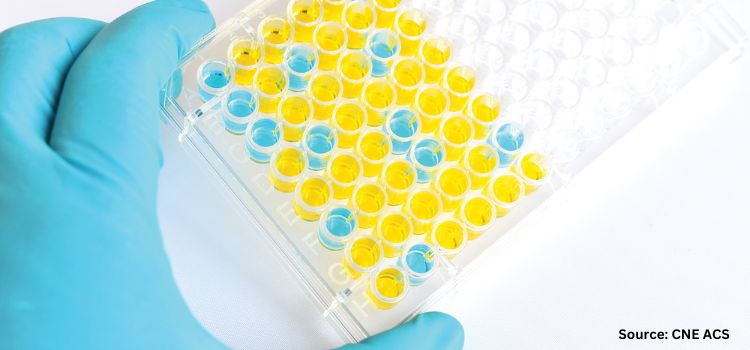
Molecular Cytogenetics Market by Products (Instruments, Kits & Reagents, Software, Services), by Technologies (Fluorescence in Situ Hybridization (FISH) and Comparative Genomic Hybridization (CGH)), by Applications (Genetic Disorder, Personalized Medicine, and Others), and by End User (Hospitals, Clinicals & Research Laboratories, Pharmaceutical & Biotech Companies, and Others) – Global Opportunity Analysis and Industry Forecast – 2024 – 2030
US Tariff Impact on Molecular Cytogenetics Market
Trump Tariffs Are Reshaping Global Business
Molecular Cytogenetics Market Overview
The global Molecular Cytogenetics Market size is estimated at USD 2.59 billion in 2023 and is predicted to reach USD 5.08 billion by 2030 with a CAGR of 10.1% from 2024-2030.
The molecular cytogenetics market is a specialized field that merges cytogenetics and molecular biology to analyze chromosome structure, function, and genetic variations at a molecular level. It utilizes advanced technologies such as fluorescence in situ hybridization (FISH) and comparative genomic hybridization (CGH) to identify chromosomal abnormalities and mutations, providing critical insights for diagnosing genetic disorders, cancer, and other diseases.
The benefits of this technique include enhanced accuracy in disease detection, improved treatment planning, and personalized medicine that leads to better patient outcomes. This also offers higher resolution and the ability to detect subtle genetic changes, making it a more effective tool for clinicians and researchers. Thus, this market plays a pivotal role in advancing healthcare and shaping the future of genetic diagnostics and personalized treatment strategies.
Market Dynamics and Trends
The rising prevalence of diseases such as cancer and sickle cell disease fuels the growth of the industry as it amplifies the need for advanced diagnostic tools and technologies. The rise in such diseases creates need for precise detection of genetic mutations and chromosomal abnormalities provided by molecular cytogenetics.
According to the latest report published by the World Health Organization (WHO), cancer cases are projected to exceed 35 million by 2050, representing a 77% increase from the estimated 20 million cases in 2022. This surge in cases increases demand for innovative diagnostic and monitoring solutions for precise detection and management.
Moreover, increasing healthcare expenditure is driving molecular cytogenetics market demand due to the growth of advanced diagnostic tools and technologies for precise genetic testing and early detection of diseases. This facilitates the adoption of molecular cytogenetics techniques in hospitals and laboratories, improving diagnostic accuracy and personalized treatment options, that ultimately boost the demand for cytogenetic solutions in clinical and research settings.
According to the latest report published by the World Bank Group, healthcare expenditure per capita globally accounted for USD 1265 in 2021 compared to USD 1179 in 2020 marking a growth of 7.3% within a year. The rise in health spending highlights the growing focus on advanced diagnostics techniques, driving demand for genetic analysis solutions.
Also, the rapid expansion of health services further fuels the market growth as it increases the demand for advanced diagnostic tools and technologies. The necessity for accurate genetic analysis in healthcare environments propels the adoption of molecular cytogenetics techniques, that is essential for diagnosing genetic disorders, guiding personalized medicine, and conducting research in genomics.
For instance, the World Bank Group aims to expand health services to 1.5 billion people by 2030. Thus, this initiatives by organizations fuel implementation of genetic screening programs that further elevates the need for molecular cytogenetics solutions. However, the high costs of advanced technologies and complex regulatory frameworks for approving and commercializing the molecular cytogenetics market growth.
On the contrary, adoption of new technology including optical genome mapping in molecular cytogenetics is expected to create ample growth opportunity for the market in future. For instance, in August 2024, Dartmouth Health launched optical genome mapping, a digital transformation technology that improves cancer diagnosis by capturing high-resolution chromosome images and using specialized software to detect chromosomal abnormalities.
These innovations pave the way for more accurate diagnostics and personalized treatment strategies for various genetic disorders and cancers, highlighting the promising future of thie market.
Market Segmentations and Scope of the Study
The molecular cytogenetics market report is segmented on the basis of products, technologies, applications, and region. On the basis of products, the market is divided into instruments, kits & reagents, software and services. On the basis of technologies, the market is segmented into fluorescence in situ hybridisation (FISH), and comparative genomic hybridisation (CHG). On the basis of applications, the market is divided into genetic disorder, personalized medicine, and others. On the basis of end user, the market is divided into hospitals, clinicals & research laboratories, pharmaceutical & biotech companies, and others. Regional breakdown and analysis of each of the aforesaid segments includes regions comprising of North America, Europe, Asia-Pacific, and RoW.
Geographical Analysis
North America dominates the molecular cytogenetics market share at present and is projected to continue its dominance throughout the forecast period. This dominance is due to the increasing prevalence of down syndrome cases in the countries such as U.S., Canada, and others creates demand for advanced diagnostic methods including molecular cytogenetics.
As per the latest report published by the Centers for Disease Control and Prevention (CDC), about 5700 babies born in the U.S. each year suffer from down syndrome that accounts to 1 in every 640 babies. The growing number of cases drives the need for accurate prenatal and postnatal diagnostic tools to detect early chromosomal abnormalities, thereby driving market growth.
Moreover, growing investments in genomic research from government agencies including National Institute of Health (NIH) accelerates development of molecular cytogenetics technologies. The investment enables more extensive and in-depth research studies that leads to innovative revelations into genetic disorders and chromosomal abnormalities.
The National Institute of Health, invested around USD 45 billion in 2022 towards biomedical research to enhance life and reduce illness and disability. These investments accelerate commercialization of new technologies and solutions for molecular cytogenetics developed through research that ultimately propels the market growth.
On the other hand, Asia-Pacific is considered fastest growing region in the molecular cytogenetics industry due to the rising healthcare expenditures that boost funding for advanced medical technologies including molecular cytogenetics.
According to the latest report published by the World Bank, healthcare expenditure in the Republic of Korea represented 9.72% of GDP, reflecting a 4% increase from 2021. This rise in healthcare spending enables hospitals and clinics to adopt more advanced genetic testing methods, fueling the growth of the market.
Furthermore, increasing cancer prevalence in this region driven by factors such as aging population and environmental pollution leads to the need for advanced diagnostics and treatment solutions.
As per Indian Council of Medical Research (ICMR) the number of cancer cases in India accounted for 26.7 million in 2021 and it is expected to reach 29.8 million in 2025, that is a growth of 11.6% in the span of 4 years. This surge in cancer vaccine cases create a need for more precise methods to detect and analyse cancerous cells that leads to greater adoption of molecular cytogenetics technologies.
Competitive Landscape
Molecular cytogenetics industry comprises of several key market players such as Neuberg Diagnostics, Thermo Fisher Scientific Inc., Abbott Laboratories, DSS Imagetech Pvt. Ltd., Bionano Genomics, Inc., Illumina, Inc., Agilent Technologies, Inc, Oxford Gene Technology IP Ltd., Weill Cornell Medicine, Cytotest Inc., and others. These market players are adopting various strategies such as launches and partnerships to maintain their dominance in the industry.
For example, in August 2023, Thermo Fisher Scientific Inc., launched the Applied Biosystems Cytoscan HD Accel array, a new chromosomal microarray designed to improve cytogenetic research lab productivity, efficiency and profitability.
Furthermore, in June 2023, OGT partnered with Applied Spectral Imaging (ASI) to enhance diagnostics capabilities through advanced imaging and analysis solutions for cytogenetic applications, including FISH and karyotyping.
Key Benefits
-
The report provides quantitative analysis and estimations of the molecular cytogenetics market from 2024 to 2030, which assists in identifying the prevailing industry opportunities.
-
The study comprises a deep-dive analysis of the current and future molecular cytogenetics market trends to depict prevalent investment pockets in the industry.
-
Information related to key drivers, restraints, and opportunities and their impact on the molecular cytogenetics market is provided in the report.
-
Competitive analysis of the key players, along with their market share is provided in the report.
-
SWOT analysis and Porters Five Forces model is elaborated on the study.
-
Value chain analysis in the market study provides a clear picture of roles of stakeholders.
Molecular Cytogenetics Market Key Segments
By Products
-
Instruments
-
Kits & Reagents
-
Software
-
Services
By Technologies
-
Fluorescence In Situ Hybridization (FISH)
-
Comparative Genomic Hybridization (CGH)
By Applications
-
Genetic Disorder
-
Personalized Medicine
-
Others
By End User
-
Hospitals
-
Clinicals & Research Laboratories
-
Pharmaceutical & Biotech Companies
-
Others
By Region
-
North America
-
The U.S.
-
Canada
-
Mexico
-
-
Europe
-
The UK
-
Germany
-
France
-
Italy
-
Spain
-
Denmark
-
Netherlands
-
Finland
-
Sweden
-
Norway
-
Russia
-
Rest of Europe
-
-
Asia-Pacific
-
China
-
Japan
-
India
-
South Korea
-
Australia
-
Indonesia
-
Singapore
-
Taiwan
-
Thailand
-
Rest of Asia-Pacific
-
-
RoW
-
Latin America
-
Middle East
-
Africa
-
Key Players
-
Neuberg Diagnostics
-
Thermo Fisher Scientific Inc.
-
Abbott Laboratories
-
DSS Imagetech Pvt. Ltd.
-
Bionano Genomics, Inc.
-
Illumina, Inc.
-
Agilent Technologies, Inc
-
Oxford Gene Technology IP Ltd.
-
Weill Cornell Medicine
-
Cytotest Inc.
REPORT SCOPE AND SEGMENTATION:
|
Parameters |
Details |
|
Market Size in 2023 |
USD 2.59 Billion |
|
Revenue Forecast in 2030 |
USD 5.08 Billion |
|
Growth Rate |
CAGR of 10.1% from 2024 to 2030 |
|
Analysis Period |
2023–2030 |
|
Base Year Considered |
2023 |
|
Forecast Period |
2024–2030 |
|
Market Size Estimation |
Billion (USD) |
|
Growth Factors |
|
|
Countries Covered |
28 |
|
Companies Profiled |
10 |
|
Market Share |
Available for 10 companies |
|
Customization Scope |
Free customization (equivalent up to 80 working hours of analysts) after purchase. Addition or alteration to country, regional, and segment scope. |
|
Pricing and Purchase Options |
Avail customized purchase options to meet your exact research needs. |

















 Speak to Our Analyst
Speak to Our Analyst





















